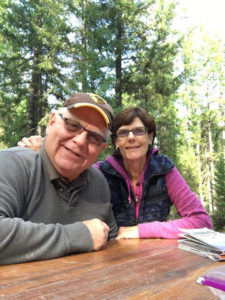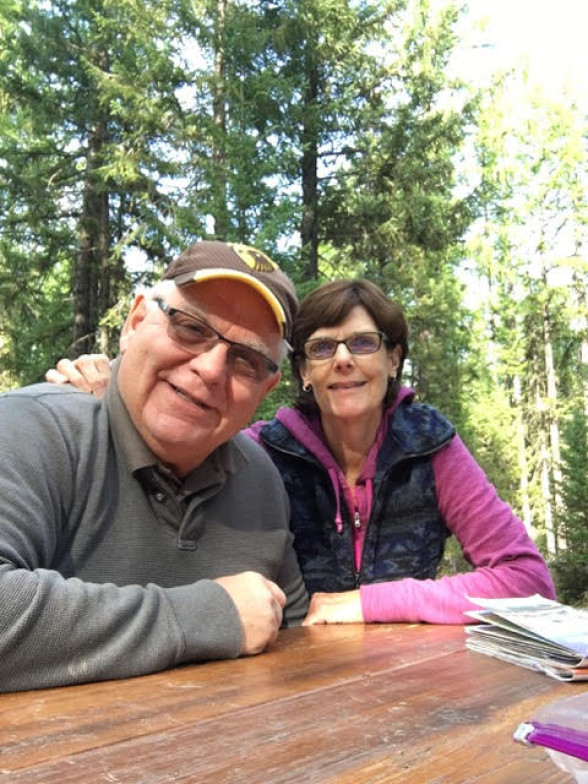 We recently had the pleasure of sitting down with one of our Board members, Wally Cox, to find out more about his experiences as a person living with younger-onset dementia. This interview is part of a new series we are doing at Dementia Alliance International (DAI) that explores the lived experience of people around the world who are living with any type of dementia.
We recently had the pleasure of sitting down with one of our Board members, Wally Cox, to find out more about his experiences as a person living with younger-onset dementia. This interview is part of a new series we are doing at Dementia Alliance International (DAI) that explores the lived experience of people around the world who are living with any type of dementia.
Please donate today to our campaign to help raise funds to provide improved online support and services for our members and their families, who like Wally, all live with and are facing dementia.
This month, we are highlighting Wally’s story in honor of International Day of Families 2020.
Every year, the United Nations supports this worldwide observance on 15 May. The 2020 COVID-19 pandemic is a challenging social and global health crisis which brings into sharp focus the importance of protecting vulnerable individuals and families, as well as fostering greater equality for all.
DAI’s vision is a world where all people are valued and included.
We recognize that dementia affects not only people living with a diagnosis, but their families as well. In times of crisis, it is families who stand together, shelter one another, and care for one another. We applaud Wally and celebrate him as a person living with dementia who shows us the meaning and value of family in times of crisis.
Wally, tell us a little about yourself.
I live in northern California with my wife, Pat. We have three kids and two grandchildren and have been married since the day after Pat graduated from high school.
I was diagnosed with dementia at 62. The doctors have diagnosed me with a few different things including frontotemporal dementia and Alzheimer’s, because they are not quite sure what is going on.
Dementia runs in my family. My grandmother became senile (that’s what they called it back then) when she was in her late seventies. Fast-forward a few years and my dad – who was in his sixties – started exhibiting some odd behaviors and doing things that were seemingly out of character. It wasn’t until he got into his eighties that the doctors said he probably had dementia of some kind. That was about the time that I started having problems. And I also have a brother who has been diagnosed with Lewy body dementia.
Q: What impact has this had on your family, having so many generations of people needing care and people needing to be cared for?
My grandparents lived very simple lives and didn’t have much, so when my grandmother got sick, the burden fell on my parents to help her out. There was no support for my mother when she was caring for my grandmother. Finally, they put her into one of those homes. She was there for a few years, drifted away and then was gone.
My dad is a little bit of a different story because my mother was dealing with him by herself. When he got very hard to deal with, I built a house for him next door to me so they could live separately. They were not rich. They were middle class. Half of my mom’s income went to support my dad, and then she was living on the other half.
Years ago, I had been a caregiver for my wife. She had gotten really, really ill twice. The second time, to the point of death’s door. So when I became sick, we had already learned through experience a lot about being a person who needs care and a lot about being a person who gives care.
Q: What has that transition been like, going from care-provider to care-receiver?
After my wife got sick, I built emotional walls between me and her because I was afraid of having my heart ripped out when she died.
I felt like if I put some distance between us, I could survive losing her.
But through counseling and some really honest conversations, we got through that. In the process, I learned that I didn’t need to build walls. I needed to build connections.
When I got diagnosed with this disease, I became a person who needed care. My first reaction? To build walls again because I was ashamed of what I had.
The day I was diagnosed, she told me that she would never leave me, that she would always be there for me, and that she was with me to the end. Just like I couldn’t cure her, she can’t cure me. But she can be with me and that means a lot.
Q: In your opinion, what can we do as a nation and as a society to support and protect vulnerable people and their families in times of crisis?
I think that in the United States, we have done a pretty poor job as a government and as a society in understanding how to best do this.
The doctor who diagnosed me with dementia relocated to Palo Alto - a rather affluent area. He said that a lot of his patients, upon hearing that their mother or father has dementia, the first words out of their mouth are ‘We have got to find a [care] home for them’. As if they are disposable.
My wife’s aunt and uncle live in Tasmania. She has had a stroke and uses a wheelchair. They have all sorts of help – offered by the government – to help them stay in their home. People bring them meals. They come and help with the garden. They help with her care and get her showered because her husband is quite old – almost 90 – so he can’t do these things. The government has gone to extraordinary lengths to help them continue live in their home, which is actually a lot cheaper than if they had to go live in an elder care home.
The Tasmanian government is measuring success by being able to keep you in your home, and that does not seem to be the theme that we see in the United States.
I think that you’re measured by what you do to the least of you, how you treat the least of you: the most vulnerable, the children, the invalids, and the sick. As a person with dementia, what a lot of people don’t understand is that I still have feelings. I still have intelligence and the ability to relate. I forget things and I don’t always do things right, but I am a human being.
Q: In your experience, how does DAI make a difference in the lives of the families of people living with dementia?
As a support group co-host, I meet lots of new people. Sometimes they come to our online support groups for a long time and sometimes just for one or two visits. But overall, the one response we have heard from people is that when they leave that meeting and are back with their families, they’re like a whole different person.
When you’re diagnosed with a fatal disease like this, you feel cast asunder and not really anchored to anything. You just kind of float around in the ocean of worry and concerns. Our support groups are a place where you can find rest. You share with your friends and you start looking forward to the next meeting, to the next week. You’ve got something coming up and you want to learn, and people make you laugh.
So, one way that Dementia Alliance International helps families is by helping people with dementia actually become better family members. I know that when I am less fatalistic and less depressed, I am easier to be around.
Also, caregivers get a break during our support group meetings. My wife knows I am occupied for that hour and a half. She gets the chance to do something else besides pay attention to me.
It also allows the caregiver to realize that dementia may not be as gloomy as first thought.
**************************************************************************
This month, as we highlight Wally’s story in honor of the International Day of Families, you can help Dementia Alliance International continue to represent, support and educate people living with dementia, their families, and the wider dementia community by donating to us to support more people like Wally.
